Violent, brutal, biting: An interview with the cast of Hamlet

“Denmark’s a prison” says Hamlet. Director Zoe Ford interprets this line literally in her violent, brutal, biting adaptation. This is not remotely the Shakespeare most are familiar with, no distant Danish kingdom – it’s Liverpool. Hamlet is bounded in a prison cell, left to battle with the infinite space of his messed-up mind. The Upcoming spoke with the cast and producer about this exciting new production:
What makes this production of Hamlet special?
Anthony Kernan (Polonius): It’s vibrant, fast moving and edgy.
Chris White (Rosencrantz): It’s real, it’s dark and it’s northern, Shakespeare always sounds better when it’s northern…
Jessica White (Ophelia): It’s a fearless and contemporary take using the original script. What’s special is how we interpret the text, make it relevant and clear, centering the production around the characters and relationships.
Joyce Greenaway (Gertrude): The incredibly generous, intelligent and talented company and cast and the total commitment to making it the best it can be.
Adam Lawrence (Hamlet): It’s a bold and fresh take on the play. It has a raw and very non-conventional feel to it.
Lewis Howard (Horatio): The style. It’s so much fun to be able to reinvent a script in what is hopefully a completely original way. Sculpting the language around a new concept is such an exciting creative process.
Damian Escayg (Francisco): Everything! The incredible staging and set design, the brave choices of the actors and the grab you by the balls way the story is told.
How can Hamlet, probably one of the most widely performed plays ever, be refreshed beyond just changing the setting?
AK: Because it’s set in a prison, the characters are different to how you might expect. Their decisions are influenced by other factors that are not just in the text.
CW: Everyone has different interpretations, Shakespeare’s text is so rich that there are seven billion or so potential versions of the character of Hamlet.
JW: Every new actor brings something individual to a character. Even the most established as well-known characters can be looked at in a different light and delivered differently. The great thing about Hamlet is that he, and the other characters, are so relatable and easily adapted. The bones of the character are there in the text but a performance will always be as individual and brave as the actor.
JG: It is modern in its thought, so modern folks, playing it with truth, refresh it nightly.
AL: Each actor brings a different make up and personality to the last, which brings a refreshing element in itself. We also have little interjections of modern text, which glide in and out of the classical text and give it a sharp twist.
LH: I think it has to be refreshed every time. Whether it’s the setting, the character or the style, no one wants to see the same production again and again. The challenge is to create something that has never been seen before and that can be done in many different ways, a few of which I think we’ve demonstrated.
How do you go about inspiring younger people, especially with Shakespeare, who can come across as a bit boring to students who have to study it at school?
Nikki Anderson (producer): I think we need to capture children’s imaginations and enable them to take ownership of the stories. When young people are excited and engaged in something they are unstoppable. If you can encourage their opinions and ideas by asking them to take on characters and to build their world of the play, you can set their curiosity alight. The stories become theirs and not just alien, impenetrable words on a page.
If young people find it easier to identify with a Hamlet in a contemporary prison than a far-removed medieval Danish court, then it is important we make these alternative versions. If we can get them excited by the thoughts and feelings of the characters, then they will inevitably become more sensitive to and interested in how these characters express themselves through language.
CW: We can turn everything right up. For too long has Shakespeare been performed in a bland, beige way. It’s blood, it’s violence, it’s war, it’s sex, rude jokes, humanity. It’s not ruffs and pretentious pomp. My advice to young people studying Shakespeare is find a relevance to stuff you watch on telly, because writers today are still taking inspiration from a guy who died centuries ago.
JG: Bring them to see this show and let them act out the parts on a stage themselves – it comes alive when you do.
What relevance does Hamlet have for a 21st century audience?
AK: It’s just a great story, full of passion and emotion. Plays like this are going to be valid in any century.
NA: Shakespeare’s stories are about people. They are about how people behave, the choices they make and how they understand themselves and the world around them. This is why we can apply Shakespeare to a myriad of contexts. We all know how it feels to be a human being and so we can all identify with Shakespeare’s plays. Provided theatre companies focus on this humanity, Shakespeare will remain relevant.
CW: Universal themes of revenge, love and emotional isolation; it has everything.
JW: The relevance of the subject matters within this play is infinite. Everybody deals with inner turmoil, relationship breakdowns, loss and tragedy. Even if the exact circumstances aren’t familiar, every person can empathise with the situations these characters are in.
JG: Money. Sex. Power. Love. Politics. Betrayal. Revenge. Corruption. Honour. Madness. Survival. Death. Murder. I could keep going…
AL: Shakespeare writes worldly characters. We can all relate to shock, mourning, guilt, love, heartbreak. His characters may be 500 years old but traits of those still exist inside us today.
LH: For me the storyline of Hamlet will always be relevant. It is one of the classic storylines of vengeance and tragedy and is timeless. Setting it in a prison has brought a more modern substance but I don’t think we’re trying to send a message to people about prison life today, that is the tool to tell people a story that will never go out of fashion.
DE: It’s a great story with real people, depicting real life and how real people react to their given circumstances. That’s relevant in any century.
What’s the best way of approaching these roles that have been played so many times by so many people?
AK: I think the best way of approaching any role is to ignore all that’s gone before, and treat it as a new play and character.
JW: Look at the text within its new setting and adaptation with fresh eyes and an open mind! Look at what the text really means and constantly question why your character is saying what they are to make sure every choice is clear and rooted.
JG: Read the text, understand it, learn it, say it, mean it and listen to what the other actor is saying. And remember that “shoes maketh the man”, so choose them wisely.
AL: For me, the best way to approach one of the world’s famous speeches, “to be or not to be” is to forget that it’s so well known (to the extent that audience will probably be mouthing along to it with me), and take all pressure off by solely relying on the thoughts and the truth to guide me through.
DE: By first understanding the text. Then considering the environment you are in. And then working on what you can bring to the character.
This question particularly to Adam Lawrence (Hamlet): are you drawing inspiration from any particular incarnations of Hamlet, or any other characters, plays, films, books in general?
AL: Starred Up gave me a good insight into prison life. Kenneth Branagh did a fantastic Hamlet, but my inspiration has come more from the situation and circumstances I find myself going through in the play, and letting it manifest in me in its own way. Roger Rees said “you can’t play Hamlet, Hamlet plays you”, and it’s true. While everyone tries to bring something new to it, they can only really bring themselves, and let it play them.
What’s the rehearsal process been like?
AK: Hard work, enjoyable and entertaining
CW: Too much fun, far too interesting.
JW: The rehearsal process has been great! A real sense of freedom and play was established straight away where, as actors, we felt free to come with ideas and improvise. Zoe is an extraordinarily brave and intelligent director who shaped the piece beautifully without us feeling blocked by pressure.
JG: Amazing! And short – for me. A challenge that I am proud to have met but I had a very kind, patient and encouraging director and cast to support me. Awesome.
AL: Extraordinary. Zoe is a genius of a woman, and the process has seemed very easy, when in actual fact it probably wasn’t, and we did a lot of background work. Zoe put us through improvisations with each other, building character and also creating lasting memories for our characters to familiarise each other with.
LH: An absolute joy. There were moments throughout the process where a scene or a moment suddenly hits home and a lot of those came when we started playing with set, props and costume that placed us in the prison. A perfect blend of efficiency and patient creativity.
DE: Amazing: nothing better than a hard working creative environment. Perfect conditions for ideas to grow and be realised.
How have you immersed yourselves into the grim, brutal world of prison life?
AK: Just by trying to think a lot about the characters emotions, and how they would react in any given situation.
CW: You watch and read what you can to find your character, but it’s not healthy to bring that stuff home: it’s too dark, leave it at the stage door.
JW: I’ve had to look into the life of a woman who lives and works in a very intimidating, male-dominated situation, and holds her own! How do you grow up without a female presence but still have control of your femininity and sexuality to any extent? I’ve had to explore where a woman can draw strength and courage from to deal with such extreme circumstances on a daily basis.
JG: I’ve visited prison, but I just watch the cast…
AL: I asked around former inmates about life is like spent inside – what kept them going, what they ate, their first night in prison, how they coped being under watch, by guards and prisoners alike. One of our cast has been to prison himself, so it was good to ask him to put us right when we would go off course and do something that wouldn’t be done in that sort of environment.
LH: Seeing the space was the biggest step for me. Prior to that, the nature of the scenes and the character interactions away from the script are what linked me to a threatening and dangerous environment
DE: By imagining.
What’s been the best thing about being involved in the production?
AK: The rest of the cast and crew, who have been brilliant.
JW: It’s a fantastic play, working with an incredible creative team, an honest and generous cast, in a fantastic theatre! There are too many good points to list!
JG: Watching the fight scenes!
AL: Getting to perform with an amazing cast, having the time of my life and playing the best written character in all of literature.
LH: Working with new cast members and developing a whole new working dynamic. And getting to pretend to watch a football game on stage
DE: The people.
For each cast member – what is your favourite Shakespeare play or, if you don’t like Shakespeare, what is your favourite play?
AK: Hamlet, without a doubt.
NA: When I was 18, I went to see Filter Theatre’s Twelfth Night. It was audience interactive and I was asked to jump on stage to dance and drink tequila with Sir Toby Belch. I came away from that production a bit tipsy but also with a much more visceral understanding of Shakespearean comedy than I have ever experienced again.
CW: King Lear (tragedy), Henry IV Part I (history), and A Midsummer Night’s Dream (comedy)
JW: I love Shakespeare and relish the chances I get to watch different adaptations and reincarnations of the stories. Every time you watch a play done well, where the company have succeeded in being clear storytellers, you gain a new insight into the text and characters, making in relevant and relatable. I must say though, I’m a sucker for A Midsummer Night’s Dream!
JG and LH: Richard III.
AL: I’m going to be naughty – Macbeth. Hamlet is outstanding, but there are plot holes.
DE: Hamlet at the moment, but it does change.
The play begins with the sighting of the ghost of Hamlet’s father: has any of the cast ever seen a ghost?
Jess – No, and I’m easily scared so I’m glad I haven’t…yet!
Lewis – There’s no such thing as ghosts.
DE: Errrr, nope.
Timothy Bano
Hamlet is at Riverside Studios until 22nd June 2014. For further information or to book visit the theatre’s website here.
Read our review of Hamlet here.

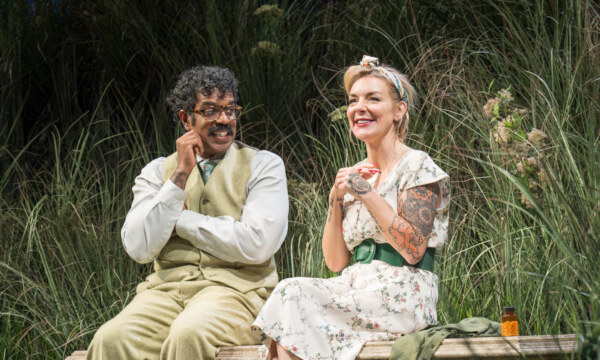
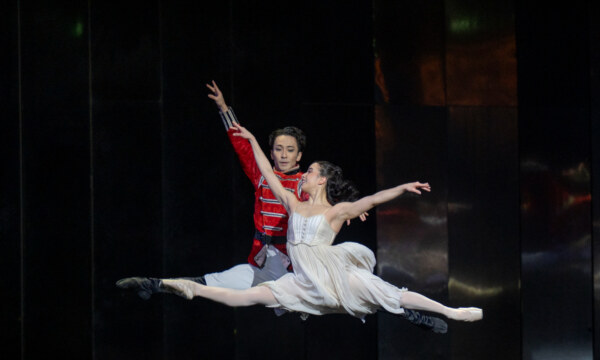
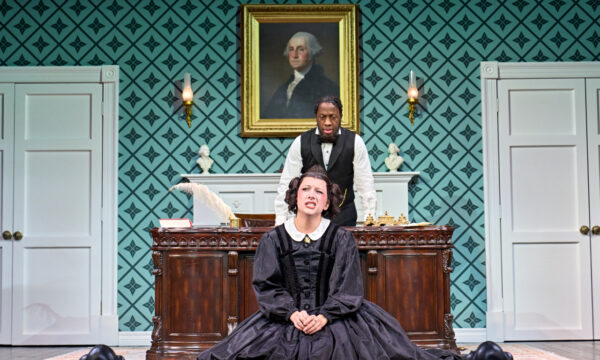
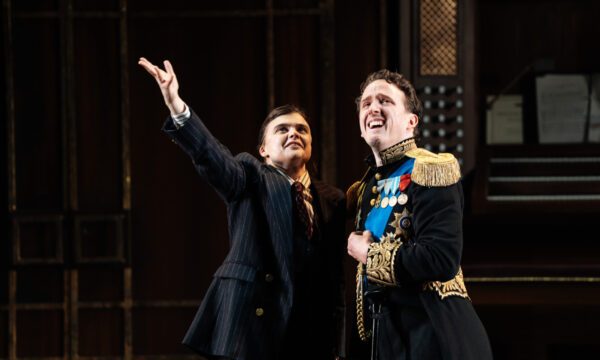

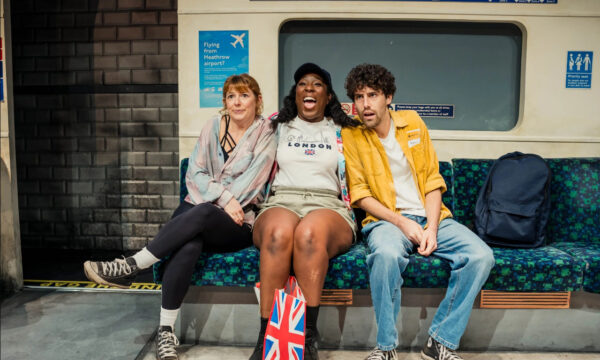
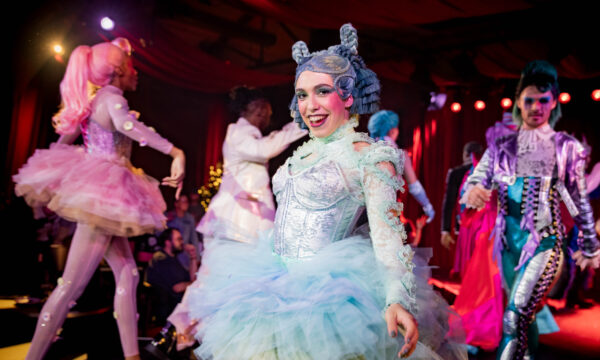
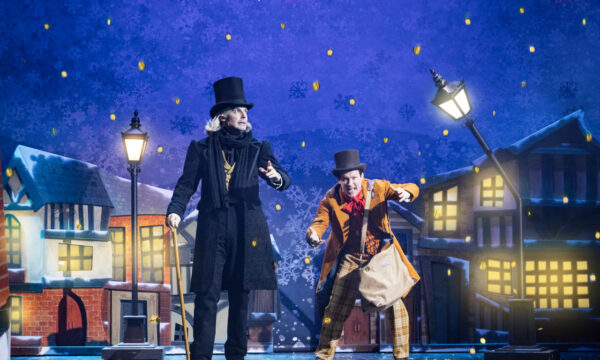
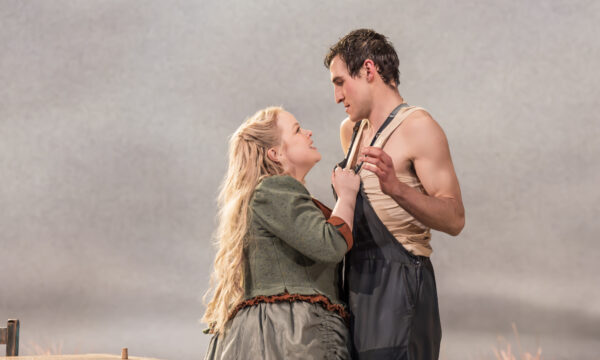

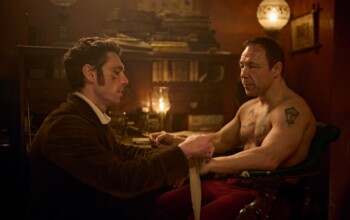
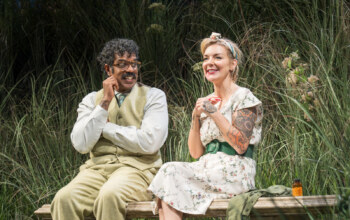
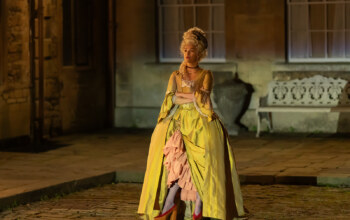
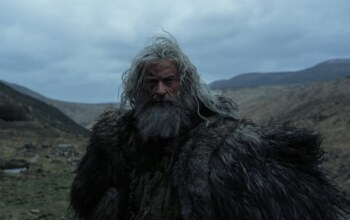
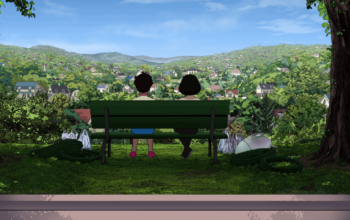






Facebook
Twitter
Instagram
YouTube
RSS